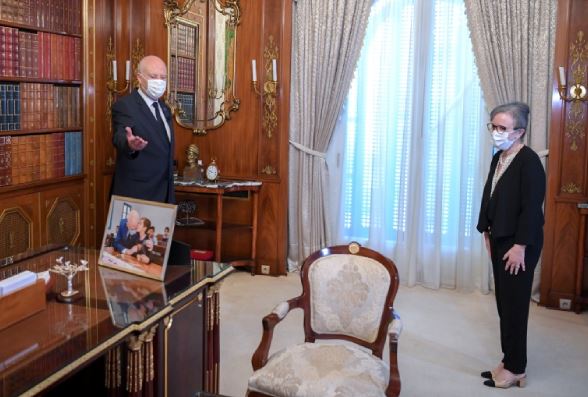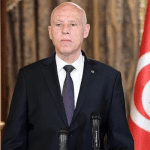Tunisian President Kais Saied stunned many by naming Najla Bouden Romdhane, a 63-year-old professor at a top engineering school, as the country’s first female prime minister on Wednesday.
The geologist was named prime minister after Saied froze parliament and assumed executive powers on July 25, putting the country in limbo.
Saied’s office issued a statement ordering Bouden to fill Cabinet positions as soon as possible.
The president’s measures pushed the Islamist Party out of power in the legislature, prompting detractors to call his actions a coup that jeopardizes the country’s fledgling democracy and threatens democratic advances made following the Tunisia Revolution in the early 2010s, which helped launch the Arab Spring.
Last week, Saied suspended most of the constitution, contending he could govern by decree during an indefinite “exceptional” period.
He said Bouden’s selection praised Tunisian women in an online video, and that the transitional administration should fight corruption and react to public demands of all kinds, including health, education, and transportation.
Under the 2014 constitution, Bouden may have less power than her predecessors. When the emergency period was announced last week, Saied stated that the transitional administration will be accountable to the president.
Tunisian President Kais Saied stunned many by naming Najla Bouden Romdhane, a 63-year-old professor at a top engineering school, as the country’s first female prime minister on Wednesday.
The geologist was named prime minister after Saied froze parliament and assumed executive powers on July 25, putting the country in limbo.
Saied’s office issued a statement ordering Bouden to fill Cabinet positions as soon as possible.
The president’s measures pushed the Islamist Party out of power in the legislature, prompting detractors to call his actions a coup that jeopardizes the country’s fledgling democracy and threatens democratic advances made following the Tunisia Revolution in the early 2010s, which helped launch the Arab Spring.
Last week, Saied suspended most of the constitution, contending he could govern by decree during an indefinite “exceptional” period.
He said Bouden’s selection praised Tunisian women in an online video, and that the transitional administration should fight corruption and react to public demands of all kinds, including health, education, and transportation.
Under the 2014 constitution, Bouden may have less power than her predecessors. When the emergency period was announced last week, Saied stated that the transitional administration will be accountable to the president.
Tunisian President Kais Saied stunned many by naming Najla Bouden Romdhane, a 63-year-old professor at a top engineering school, as the country’s first female prime minister on Wednesday.
The geologist was named prime minister after Saied froze parliament and assumed executive powers on July 25, putting the country in limbo.
Saied’s office issued a statement ordering Bouden to fill Cabinet positions as soon as possible.
The president’s measures pushed the Islamist Party out of power in the legislature, prompting detractors to call his actions a coup that jeopardizes the country’s fledgling democracy and threatens democratic advances made following the Tunisia Revolution in the early 2010s, which helped launch the Arab Spring.
Last week, Saied suspended most of the constitution, contending he could govern by decree during an indefinite “exceptional” period.
He said Bouden’s selection praised Tunisian women in an online video, and that the transitional administration should fight corruption and react to public demands of all kinds, including health, education, and transportation.
Under the 2014 constitution, Bouden may have less power than her predecessors. When the emergency period was announced last week, Saied stated that the transitional administration will be accountable to the president.
Tunisian President Kais Saied stunned many by naming Najla Bouden Romdhane, a 63-year-old professor at a top engineering school, as the country’s first female prime minister on Wednesday.
The geologist was named prime minister after Saied froze parliament and assumed executive powers on July 25, putting the country in limbo.
Saied’s office issued a statement ordering Bouden to fill Cabinet positions as soon as possible.
The president’s measures pushed the Islamist Party out of power in the legislature, prompting detractors to call his actions a coup that jeopardizes the country’s fledgling democracy and threatens democratic advances made following the Tunisia Revolution in the early 2010s, which helped launch the Arab Spring.
Last week, Saied suspended most of the constitution, contending he could govern by decree during an indefinite “exceptional” period.
He said Bouden’s selection praised Tunisian women in an online video, and that the transitional administration should fight corruption and react to public demands of all kinds, including health, education, and transportation.
Under the 2014 constitution, Bouden may have less power than her predecessors. When the emergency period was announced last week, Saied stated that the transitional administration will be accountable to the president.
Tunisian President Kais Saied stunned many by naming Najla Bouden Romdhane, a 63-year-old professor at a top engineering school, as the country’s first female prime minister on Wednesday.
The geologist was named prime minister after Saied froze parliament and assumed executive powers on July 25, putting the country in limbo.
Saied’s office issued a statement ordering Bouden to fill Cabinet positions as soon as possible.
The president’s measures pushed the Islamist Party out of power in the legislature, prompting detractors to call his actions a coup that jeopardizes the country’s fledgling democracy and threatens democratic advances made following the Tunisia Revolution in the early 2010s, which helped launch the Arab Spring.
Last week, Saied suspended most of the constitution, contending he could govern by decree during an indefinite “exceptional” period.
He said Bouden’s selection praised Tunisian women in an online video, and that the transitional administration should fight corruption and react to public demands of all kinds, including health, education, and transportation.
Under the 2014 constitution, Bouden may have less power than her predecessors. When the emergency period was announced last week, Saied stated that the transitional administration will be accountable to the president.
Tunisian President Kais Saied stunned many by naming Najla Bouden Romdhane, a 63-year-old professor at a top engineering school, as the country’s first female prime minister on Wednesday.
The geologist was named prime minister after Saied froze parliament and assumed executive powers on July 25, putting the country in limbo.
Saied’s office issued a statement ordering Bouden to fill Cabinet positions as soon as possible.
The president’s measures pushed the Islamist Party out of power in the legislature, prompting detractors to call his actions a coup that jeopardizes the country’s fledgling democracy and threatens democratic advances made following the Tunisia Revolution in the early 2010s, which helped launch the Arab Spring.
Last week, Saied suspended most of the constitution, contending he could govern by decree during an indefinite “exceptional” period.
He said Bouden’s selection praised Tunisian women in an online video, and that the transitional administration should fight corruption and react to public demands of all kinds, including health, education, and transportation.
Under the 2014 constitution, Bouden may have less power than her predecessors. When the emergency period was announced last week, Saied stated that the transitional administration will be accountable to the president.
Tunisian President Kais Saied stunned many by naming Najla Bouden Romdhane, a 63-year-old professor at a top engineering school, as the country’s first female prime minister on Wednesday.
The geologist was named prime minister after Saied froze parliament and assumed executive powers on July 25, putting the country in limbo.
Saied’s office issued a statement ordering Bouden to fill Cabinet positions as soon as possible.
The president’s measures pushed the Islamist Party out of power in the legislature, prompting detractors to call his actions a coup that jeopardizes the country’s fledgling democracy and threatens democratic advances made following the Tunisia Revolution in the early 2010s, which helped launch the Arab Spring.
Last week, Saied suspended most of the constitution, contending he could govern by decree during an indefinite “exceptional” period.
He said Bouden’s selection praised Tunisian women in an online video, and that the transitional administration should fight corruption and react to public demands of all kinds, including health, education, and transportation.
Under the 2014 constitution, Bouden may have less power than her predecessors. When the emergency period was announced last week, Saied stated that the transitional administration will be accountable to the president.
Tunisian President Kais Saied stunned many by naming Najla Bouden Romdhane, a 63-year-old professor at a top engineering school, as the country’s first female prime minister on Wednesday.
The geologist was named prime minister after Saied froze parliament and assumed executive powers on July 25, putting the country in limbo.
Saied’s office issued a statement ordering Bouden to fill Cabinet positions as soon as possible.
The president’s measures pushed the Islamist Party out of power in the legislature, prompting detractors to call his actions a coup that jeopardizes the country’s fledgling democracy and threatens democratic advances made following the Tunisia Revolution in the early 2010s, which helped launch the Arab Spring.
Last week, Saied suspended most of the constitution, contending he could govern by decree during an indefinite “exceptional” period.
He said Bouden’s selection praised Tunisian women in an online video, and that the transitional administration should fight corruption and react to public demands of all kinds, including health, education, and transportation.
Under the 2014 constitution, Bouden may have less power than her predecessors. When the emergency period was announced last week, Saied stated that the transitional administration will be accountable to the president.













